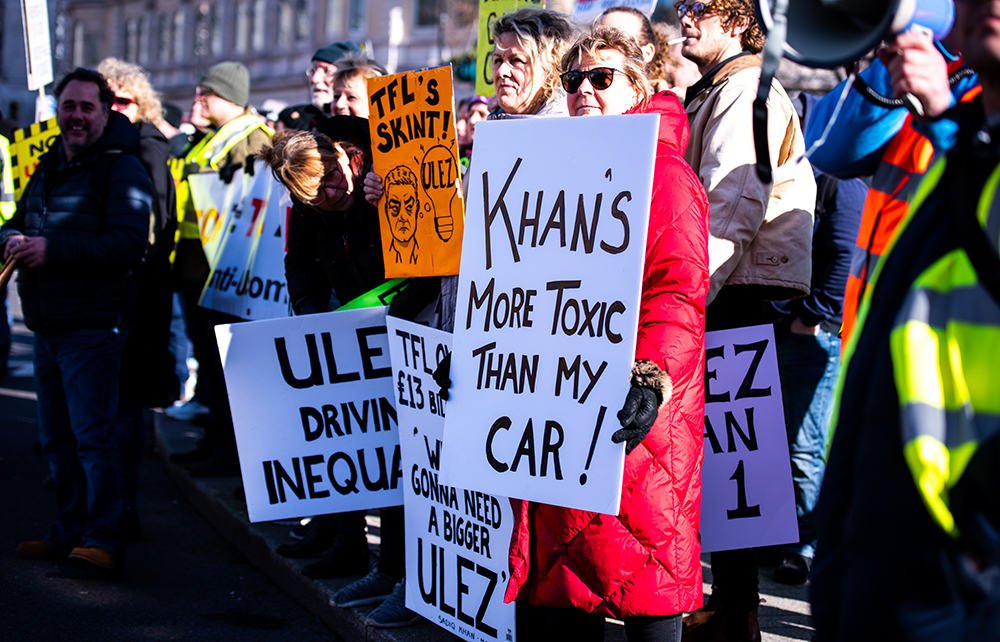London faces its seventh mayoral election next year and, yet again, the Tories are having trouble finding a suitable candidate. The publication this week of the final shortlist – Susan Hall, Daniel Korski and Mozammel Hossain – was accompanied by accusations of stitch-ups, counter-claims and legal threats between two of the defeated candidates. Sadiq Khan’s aides have enjoyed watching it all play out; Labour leads in London by a whopping 40 points. So a Tory victory next May is unlikely – but still not impossible.
Air quality in the once-smoggy capital is the cleanest it’s been for centuries, but Khan has declared a pollution ‘emergency’. He’s introduced new taxes on drivers as part of the ‘Ulez expansion’, something which his critics claim is tantamount to a ‘war on motorists’. Tories hope the expansion is unpopular enough to make him vulnerable. Even if the party does lose the next general election, a good showing in London would be seen as a prelude to recovery, as it once was with Boris Johnson. That’s why picking the right person now is so important.
A good showing in London would be seen as a prelude to recovery, as it once was with Boris Johnson
Hall is the self-styled ‘common sense’ candidate. A blue-collar pugilist who worked in a car workshop and ran her own hair business, she has spent 20 years steadily climbing the ladder of London politics. After a decade on Harrow council, she replaced Kemi Badenoch on the London Assembly in 2017 and led the Conservative grouping within two years. Her six-year stint at City Hall has been marked by frequent clashes with Sadiq Khan, packaged up in Facebook-friendly clips to delight her activist audience.
Hall’s policy platform is brief and uncomplicated: scrap Khan’s Ulez plans on day one, more family homes, a relentless focus on law and order. ‘Woke nonsense’ in the Met would be ditched and a dedicated burglary unit established in its place. ‘She wants criminals to be frightened of the police again,’ says a London Tory familiar with her thinking. Hall’s strengths are her grassroots support – ‘She’s known in the associations,’ notes one undecided councillor – and the fact that she’s the only one of the three candidates to have won an election in London.
Daniel Korski, a former Cameron aide (and Spectator contributor) feels like a throwback to another era of conservatism. The son of Jewish-Polish refugees, he emigrated from Denmark as a student at the height of ‘Cool Britannia’ and now describes himself as a tech entrepreneur. He seems the model of those ‘citizens of the world’ once derided by Theresa May. An alumnus of the European Commission, Kabul embassy and US State Department, he campaigned for Remain in 2016 before spearheading Tom Tugendhat’s leadership bid six years later.
The Korski campaign has churned out shiny graphics and unorthodox policies such as a curb on red traffic lights at night and a ‘pay per mile’ road pricing scheme to replace Ulez. He wants the Mayor to control the Crown Prosecution Service so as to boost burglary prosecution rates and introduce mandatory electronic tagging for domestic abusers. His supporters note that he is now the bookies’ favourite to be the Tory candidate and argue that he is challenging jaded perceptions of what it means to be a Conservative in the capital. ‘Before, people were saying “Nobody knows him”,’ says one Team Korski member. ‘They’re not saying that now.’
Mozammel Hossain KC is the wild card, positing himself as the epitome of the ‘London dream’. Born in a Bangladeshi mud hut, he spent his childhood beneath a tin roof as the youngest of eight siblings. He obtained his first shoes at the age of 16. Five years later he arrived in Britain, teaching himself English as he studied law. Murder, terror and drug-related cases are among those on his CV. More unconventional ones include successfully appealing a conviction for ‘Nazi style’ salutes at the 2012 Olympics.
Hossain took silk in 2019 but is regarded as a novice in Tory circles. ‘Who?’ was the most common reaction to his surprise inclusion in the final three – attributed to an impressive interview with the London party board. ‘Can he replicate what he has in a courtroom in a hustings too?’ asks one councillor. For Hossain, London is ‘the most magical place in the galaxy’. He wants to step up stop and search, crack down on drill rap gangs and target Sadiq Khan for effectively decriminalising offences such as burglary. ‘Not all London lawyers are lefties,’ jokes a supporter.
Three very different candidates then, but they all agree on three things: crime, Ulez and Khan’s record of delivery. On this last point Tories of all persuasions seem to be united. ‘Andy Street and Andy Burnham have done immeasurably better,’ says one MP who opted not to enter the race.
Most Tories believe that turning the contest into a referendum on Khan is their best chance, helped by the change to first past the post voting. They cite private polling that shows him double digits behind his party in London. But Labour has a similar opportunity to turn the election into a verdict on Johnson, Truss and the current economic climate. Korski and Hall both backed October’s mini-Budget. ‘We are in a cost-of-living crisis made in Downing Street,’ says one London Labour source. ‘Their shortlisting process has been a circus – more of the same approach that we’ve seen of the past 13 years.’ The message is clear: vote for Khan to keep the Tories out of London.

The symbiotic relationship between the two power bases is acknowledged by both sides. How then can the Tories exploit it to their best advantage? They could make the Met commissioner solely accountable to the Mayor – not allowing Khan to pin the blame on the Home Office. But given the weakness of Tory support in the capital, the party seems unable to decide whether to give its full backing to whichever candidate is chosen.
‘The support for Shaun Bailey last time was pretty muted,’ says a Tory figure. ‘No one thought he really had a chance and so they didn’t get involved.’ The Tories have to allow their candidate to launch one or two blows on Downing Street (as Johnson often did as Mayor during the Coalition). Letting go of control is against the instincts of the party machine. But if a great retrenchment is to take place, the Tories will need their redoubts. Without London, things could look very bleak indeed.







Comments